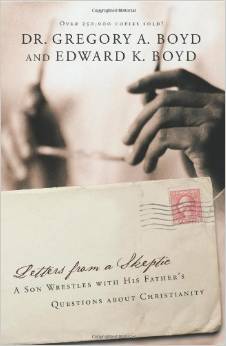The father grew up with church being part of his life. Over time, he withdrew, so the son grew up without church. While attending during college, church become part of the son’s life. In time, he became a pastor and a professor.
As one would expect, father and son would have religious discussions, and many went nowhere. Eventually, the son invited his father into an honest dialogue through written letters – and the father agree. Their format was simple – the father asks a question, then the son answers. As with any meaningful dialogue, answer lead to more questions.
Letters to a Skeptic (Gregory Boyd and Edward Boyd) is the collection of letters of such a journey. The father (Ed) asks good questions, and provides thoughts around his questions. Ed’s responses to his son  (Greg) are also direct, poignant, and relevant. Greg’s replies are respectful and (generally) easy for a layman to understand. However, the responses are also debatable within the Christian community because one size does not fit all.
(Greg) are also direct, poignant, and relevant. Greg’s replies are respectful and (generally) easy for a layman to understand. However, the responses are also debatable within the Christian community because one size does not fit all.
The father’s questions are good, such as;
- Why has Christianity done so much harm?
- Why is the world so full of suffering?
- Does God know the future?
- Is you God all-powerful?
- Why does God create earthquakes and famines?
- Are the Gospels full of contradictions?
- Isn’t the Bible full of myths and God’s vengeance?
- Do all non-Christians go to Hell?
Given the content and the situation/circumstances of the characters involved, one would think this is a book for any atheist or agnostic – or even as a toolbox for Christians when discussing religion with atheists and agnostics. Although this may be applicable to somebody in some circumstances, I see Letters to a Skeptic as an excellent read for Christians – especially in a discussion format. (Note: I read this book this book and participated in a discussion group. The book also provides discussion questions to consider.)
The discussion between father and son is sincere, respectful, and thought-provoking. Every Christian won’t agree with every point made by the son or the father – let alone by others in a discussion group. After all, theological disagreements exist with Christianity.
This book enhanced my Christian perspective, it also caused me to question the thoughts said by others – yes, the others in my own church – and that’s OK. In the end, reading and discussing Letters to a Skeptic was worthwhile – therefore, I recommend this book for those who might be interested in learning more.
